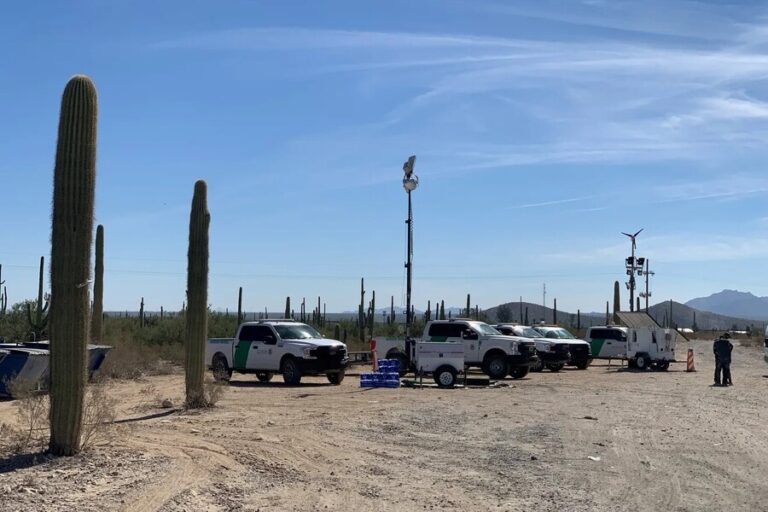Authorities in Arizona have arrested a suspected cartel scout who claims to have helped smuggle at least 1,000 undocumented immigrants into the United States over the past year. The arrest comes as President Donald Trump’s administration intensifies its efforts to crack down on illegal immigration, a cornerstone of his campaign promises and policy agenda.
Edgar Armanda Vargas-de la Rocha, a suspected scout for the Los Memos cartel, an offshoot of the powerful Sinaloa cartel, was taken into custody on February 24 in the South Maricopa Mountains, just south of metropolitan Phoenix. Dressed in camouflage and carrying binoculars, Vargas-de la Rocha was discovered by Border Patrol agents investigating a disruption in federal surveillance equipment in the area. Upon his capture, he quickly admitted to his role in the cartel’s smuggling operations.
According to court records, Vargas-de la Rocha detailed his involvement in trafficking undocumented migrants across the U.S.-Mexico border. His statements indicate that over the past year alone, he facilitated the illegal entry of approximately 1,000 individuals. Authorities also recovered communication devices from his backpack, which he allegedly used to relay real-time information about Border Patrol movements and activities.
Officials revealed that Vargas-de la Rocha had been operating undetected even after Trump’s executive orders aimed at reinforcing border security and curbing illegal immigration. He admitted that, despite increased enforcement efforts, he had successfully guided six separate groups from the border to Interstate 8, where the migrants were then transported to Phoenix.
The arrest underscores the ongoing challenges faced by law enforcement in dismantling human smuggling networks. Sean McGoffin, chief patrol agent for U.S. Customs and Border Protection’s Tucson sector, emphasized the importance of apprehending scouts like Vargas-de la Rocha. “Taking away the eyes and ears of the smugglers makes it harder to move people and contraband, making it safer for agents and communities on both sides of the international border,” McGoffin stated.
Vargas-de la Rocha reportedly earned approximately $10,000 for his role in coordinating smuggling efforts. His responsibilities included monitoring Border Patrol movements, relaying information about law enforcement activity, and ensuring safe passage for groups being guided across the border.
Following his arrest, Vargas-de la Rocha signed a plea agreement last week on federal felony charges related to conspiracy for financial gain. He now faces up to 10 years in prison, with a change of plea hearing scheduled at the federal courthouse in Phoenix on Thursday. Legal experts believe his cooperation with authorities could provide further insights into the operations of the Los Memos cartel and the broader smuggling networks tied to the Sinaloa cartel.
The arrest of Vargas-de la Rocha was part of a broader crackdown by U.S. authorities. Border Patrol agents revealed that three additional suspected scouts and a foot guide were apprehended within two days last month. Officials believe all five individuals are connected to the Los Memos cartel. In addition to charges of illegal entry into the U.S., three of the five detainees will face criminal charges for human smuggling and conspiracy.
The case also highlights the evolving tactics used by cartels to exploit vulnerabilities along the border. Despite heightened security measures, cartels have continued to adapt, utilizing advanced technology, communication networks, and even drones to evade detection. Smuggling organizations are known to operate with sophisticated logistical support, ensuring that even as law enforcement tightens its grip, their operations remain resilient.
In response to the growing cartel activity, Trump signed an executive order on his first day in office designating the Sinaloa cartel as a foreign terrorist organization. The move granted federal agencies greater authority to combat cartel operations, including freezing assets, increasing intelligence-sharing efforts, and intensifying enforcement actions against key figures involved in transnational crime.
Law enforcement officials continue to warn that while individual arrests like Vargas-de la Rocha’s are significant, dismantling an entire cartel network requires sustained and coordinated efforts between the U.S. and Mexican authorities. The Sinaloa cartel remains one of the most powerful criminal organizations in the world, with vast resources and deep-rooted connections on both sides of the border.
The arrest of Vargas-de la Rocha serves as a stark reminder of the complex and persistent challenges posed by human smuggling operations. While federal agencies have intensified their border security efforts, the continuous adaptation of cartel tactics means that the fight against illegal immigration and organized crime remains an ongoing battle. Authorities are hopeful that further arrests and intelligence gathered from suspects like Vargas-de la Rocha will contribute to more effective strategies in curbing these illegal activities.
As the Trump administration continues its aggressive approach to immigration enforcement, cases like this highlight both the successes and the ongoing difficulties in securing the U.S.-Mexico border. Whether the administration’s policies will significantly deter illegal smuggling operations remains to be seen, but for now, the arrest of one cartel scout is a step in the larger war against human trafficking and transnational crime.
